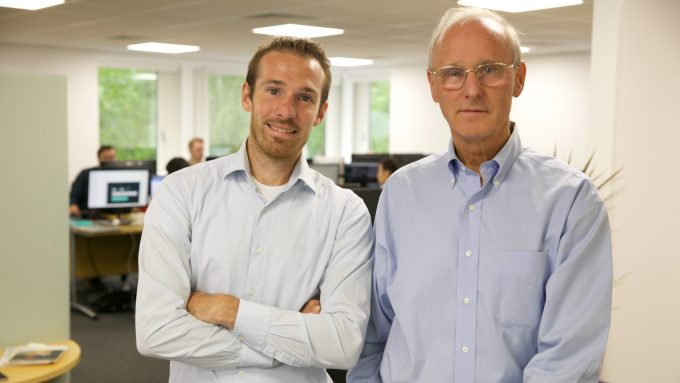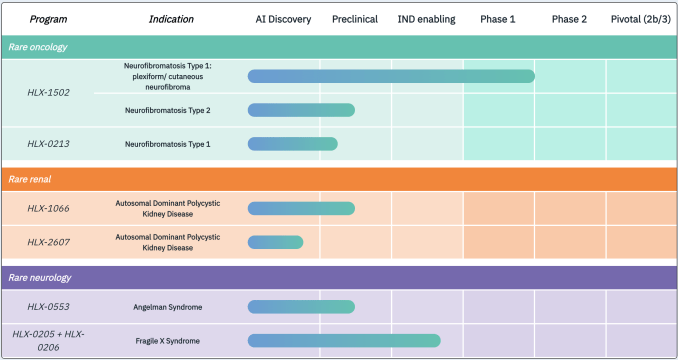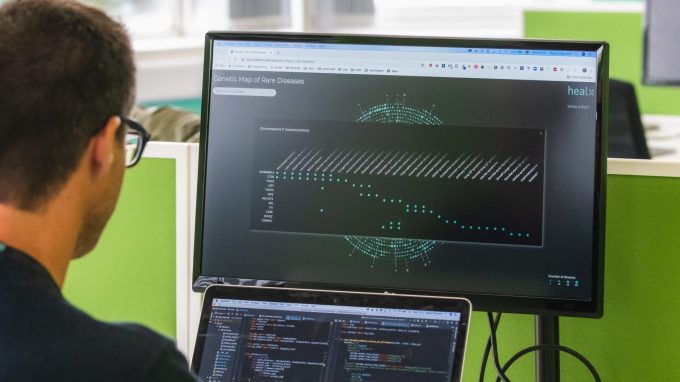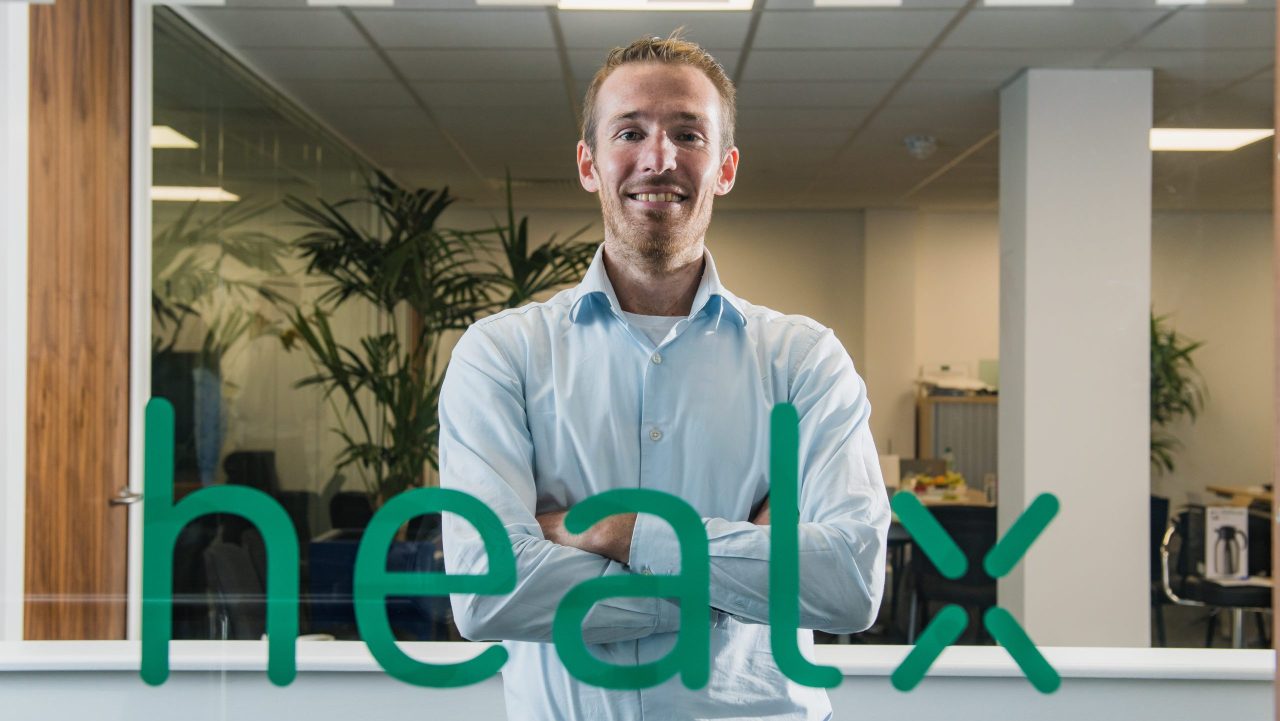Healx, a U.K. startup using AI to discover new drugs for rare diseases, has raised $47 million in a Series C round of funding co-led by Europe’s Atomico and Silicon Valley-based R42.
The company also said that it has received regulatory clearance to start Phase 2 clinical trials for a new drug in the U.S. later this year.
Healx pitches itself as a “drug discovery pipeline” that identifies hidden connections between existing chemical compounds (e.g., drugs and pharmaceuticals at various stages of the development cycle) and rare diseases. It does this by collating a myriad of public and proprietary data sources, like biomedical literature, disease and biochemical datasets, clinical trials and patents to create a “biomedical knowledge graph” of rare diseases.
“Our AI platform and expert teams enable us to identify and discover novel disease biology and match it with suitable small molecules,” Healx co-founder and CEO Tim Guilliams told TechCrunch. “Our digital biology team focuses on understanding complex biological disease signatures, while our digital chemistry team uses AI to match these signatures with chemicals, small molecules and drugs, using computational techniques such as virtual screens and generative chemistry to do so.”
Typically, pharmaceutical companies adopt what is often referred to as a “one disease, one target, one drug” approach to drug discovery. This means they start by focusing on a single molecular target that’s responsible for a disease, and then set about designing a drug to target that molecule. The problem, however, is that this is hugely time-consuming and has high failure rates, which is where Healx promises to help by analyzing millions of drug and disease data points in tandem to find hitherto undetected connections that could present new treatments using known compounds.
Founded out of Cambridge in 2014, Healx is the brainchild of Guilliams and the company’s chairman, David Brown. Guilliams has a PhD in biophysics and neuroscience from the University of Cambridge, while Brown was formerly global head of drug discovery at Roche, though he is perhaps better known as the co-inventor of famed erectile dysfunction drug, Viagra.

Drug design
With the fresh $47 million, Healx is gearing up to launch a Phase 2 clinical trial for a novel treatment it developed for neurofibromatosis Type 1 (NF1), a genetic disorder that causes tumor growth on human nerves. NF1 is considered one of the more common genetic disorders, affecting up to 1 in 3,000 individuals. While the tumors are usually benign, they can cause other symptoms related to the skin, eyes and nervous system, and they can also eventually become cancerous.
Healx had previously secured investigational new drug (IND) approval from the U.S. Food and Drug Administration (FDA) in 2021 for fragile X syndrome, and the company is also in the early AI-discovery or preclinical stages for a number of other conditions spanning oncology (cancer), renal (kidney), and neurology (nervous system).

The Phase 2 trials of Healx’s NF1 lead candidate, dubbed HLX-1502 (a tablet taken orally), are expected to start by the end of 2024 and will focus on young adults with NF1 and inoperable plexiform neurofibroma, a specific type of tumor associated with NF1.
The company arrived at HLX-1502 using an existing drug developed for something else entirely that had never launched in the U.S. The company says it is reformulating that drug, and because it already had existing safety data attached to it due to previous testing in healthy patients, it gives the company a greater degree of confidence that it will have fewer side effects.
This is important, given that Healx is focusing on a disease that often involves benign tumors in otherwise healthy patients.
“There’s a lot of cancer treatments out there, where, basically, they kill everything — the healthy cells, the unhealthy cells — and there are a lot of side effects,” Guilliams said. “So for the patient community and the families, for those who have the benign form, it can live 40 to 50 years. It doesn’t make sense to put them on chronic cancer drugs for decades with side effects that are very strong.”
Healx’s technology looks at all manner of existing drugs in development, as well as those that have been shelved for various reasons but have enough data to make them useful for others to build on.
“There’s hundreds of thousands of compounds and small molecules,” Guilliams said. “But once you start seeing patterns between different data types and predictions, you can try to select the drug that you believe is the most de-risked. AI helps us to find the best possible drug for a particular disease biology. So here, we wanted something that went specifically to the nerve, where we believed there would be fewer side effects.”

All this leads to one obvious question: If Healx has developed its leading NF1 candidate by building on work previously carried out by others, does it actually own this candidate? According to Guilliams, Healx filed and owns the patents for HLX-1502 specifically for the use of treating NF1 and “other nerve-related diseases,” and the FDA has also given it new drug product exclusivity in the U.S. market. This is usually given out for new chemical entities (NCEs), which are defined as drugs that “are innovative” or where there have been “significant changes in already approved drug products, such as a new use.”
“Comprehensive commercial and IP analysis is always conducted when selecting our lead drug candidate taken to the clinic,” Guilliams said.
However, Healx didn’t reveal the actual origins of the original compound or the safety data.
There’s money in drugs
Before this round, Healx had raised around $68 million, the bulk of which came via a $56 million Series B round in 2019. The company also recently announced an investment from one of its long-term partners, the Children’s Tumor Foundation (CTF). The CTF will provide “milestone-driven payments” to Healx as it works toward and through its clinical trials.
It’s worth noting that although the CTF is a nonprofit, this financial arrangement isn’t a grant, though Healx hasn’t revealed the terms of the investment.
What’s particularly notable is that Healx’s Series C round is $9 million less than its Series B round five years ago, which, while not entirely unheard of, is a little unusual in the startup-funding realm. Indeed, when asked what the most capital-intensive part of Healx’s business was, Guilliams said that it’s carrying out clinical trials — a phase the company is only now embarking on with its NF1 candidate.
A source familiar with the matter told TechCrunch that Healx initially tried to raise significantly more than what it had hoped for its Series C round, and the company also cut its headcount by roughly 45% last year via a series of voluntary and compulsory redundancies — around 70 staff.
Healx confirmed as much to TechCrunch, with Guilliams pointing to the economic downturn and macroeconomic factors being less than kind to the startup fraternity these past few years.
“It is important to note that when the markets crashed, we were indeed in the process of raising a larger round,” Guilliams said. “We pulled that offering off the table at that time, and we then adapted effectively to the new market conditions by streamlining operations, refocusing on our core strengths, and becoming more cost-effective and lean. This allowed us to maintain our momentum and continue making significant progress, which we are proud to announce now. Our advancements in generative AI have further enhanced our capital efficiency, enabling us to achieve more with fewer resources. We then opened up the new financing round with a better perspective on what was needed to accomplish our goals.”
Thus, Guilliams is presenting the latest incarnation of its Series C fundraise as being oversubscribed, noting that it has now raised more than it targeted.
“Given the challenging market conditions for deep tech and biotech funding over the past two years, our ability to secure this investment underscores the confidence our investors have in our approach and technology,” he added.
Healx’s raise comes amid a swathe of investments into AI-driven drug discovery platforms. These include Sam Altman-backed Formation Bio, which recently raised $372 million, as well as a new startup called Xaira that launched with $1 billion in funding — both significantly more than what Healx has raised in total.
Guilliams stressed that much of the foundation work required to get its first drug to market has been done already, so it doesn’t necessarily require as much capital this time around. He also noted that his company’s valuation has gone up since its last funding round, but declined to disclose specifics.
“What’s important is the quality of your programs — picking those that have the most potential,” Guilliams said. “The market size for NF1 is $16 billion [according to Healx’s own internal commercial analysis], and if [its candidate] works on NF1, it’s likely to work on other nerve-related diseases — we’re testing those pre-clinically already. In rare diseases, the clinical trials are smaller, so we don’t need a ton of money, which, in the current markets, is a good place to be.”
Guilliams also confirmed the company did reduce redundancies in staff roles, though declined to go into specifics around numbers or circumstances beyond the fact that it included “both voluntary and compulsory measures.”
“Despite the challenge of letting go of exceptional people, this process ultimately made us a stronger and more focused team,” he said. “This restructuring was part of our strategy to streamline operations and enhance our focus on key therapeutic areas and technological advancements.”
Market entry
Today, Healx counts around 55 employees, roughly half of whom “code,” be that in the realm of machine learning or computational biology. The other half are the clinical and pharmacology team, who “work hand-in-hand with the techies,” Guilliams said.
While the bulk of its team is based in Cambridge (U.K.), the company is now looking to expand on the ground in the U.S., where its clinical trials are set to start by December. After that, it’s likely to be several more years before anything comes close to hitting the market due to the stringent regulatory requirements for new drugs.
“Conservatively, I would say we would expect clinical results the first half of 2026, and then depending on those results and interactions with the regulators, we may need to do a second clinical trial — and then potentially register the drug,” Guilliams said.
Aside from lead backers Atomico and R42, Healx’s Series C round included participation from Ayana Capital, Balderton, Btov, Global Brain, Jonathan Milner, O2h and VU Venture Partners.






























Comment